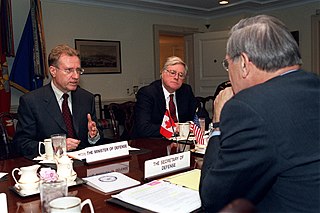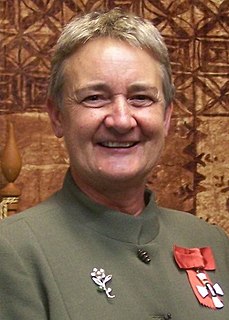A Quote by Robert Gilpin
The dreams of "leaving it up to the market" or of returning to a politically neutral gold standard cannot succeed because the nature of the monetary system has a profound impact on the interests of powerful groups and states. Affected groups and states will always try to intervene in the operation of the system to make it serve their interests.
Related Quotes
Our system of government is one of checks and balances. It requires compromise.. compromise between the Executive and the Parliament, compromise between one House and another, compromise between the States and the Commonwealth and compromise between groups of persons with legitimate interests and other groups with other legitimate interests. There is room for compromise.. indeed demand for it.. in a system of checks and balances.
Thirty-five states have Canada as their largest export market. Let's say we get into a trade war with the United States - hopefully not, but let's say. Many states in the union are going to have trouble and more costs getting their stuff up to Canada. If we make the border a little thicker in terms of tariffs, and hit back, that will start to impact the states, in particular large business interests that are in Canada. And that starts to put indirect pressure on the White House.
I do not know what will happen in China politically. I do know that it is impossible to maintain the communist system or probably even a strict one-party system when the economy becomes so pluralistic. Now, what form that takes and what institutions will evolve, I do not have a clear view about. I do not think the United States, as a general principle, ought to intervene in this.
Adam Smith's uncritically enthusiastic modern disciples portray his invisible hand theory as saying that market forces reliably harness selfish individuals to serve the common good. That's often true, but as Darwin recognized clearly, many traits that serve the interests of individual animals make life more difficult for larger groups.
If the various groups in America had been less selfish and had permitted different representatives from the groups to travel into foreign countries, and broaden their own scope, and come back and educate the movements they represented, not only would this have made the groups to which they belonged more enlightened and more worldly in the international sense, but it also would have given the independent African states abroad a better understanding of the groups in the United States, and what they stand for, what they represent.
If a country develops an economic system that is based on how to pay for the war, and if the amounts of fixed capital investment that are apparent are tied up in armaments, and if that country is a major exporter of arms, and its industrial fabric is dependent on them, then it would be in that country's interests to ensure that it always had a market. It is not an exaggeration to say that it is clearly in the interests of the world's leading arms exporters to make sure that there is always a war going on somewhere.
Oswald Mosley`s movement, it was a big movement. It was obviously anti-immigrant, anti-Semitic, it was populist. Mosley wanted to replace the parliamentary system of government in Britain with a government that was based on business interests, that was based on the idea that business interests were the real interests of that country and business interests.
and reorganizing the government to serve business interests, that would be a way to get stuff done faster and more efficiently.
For most of modern life, our strong talents and desires for group effort have been filtered through relatively rigid institutional structures because of the complexity of managing groups. We haven't had all the groups we've wanted, we've simply had the groups we could afford. The old limits of what unmanaged and unpaid groups can do are no longer in operation.





































